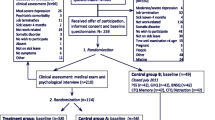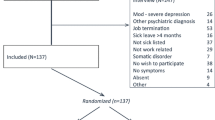Abstract
Objectives: To investigate the short-term and long-term effectiveness of two, brief, preventive, work stress management programmes. One programme was a cognition-focused programme, the other was a newly developed intervention in which physical exercise and relaxation were combined. It was hypothesised that the newly developed intervention would be more effective in reducing psychological complaints than the cognitive intervention. Both programmes consisted of four sessions in a period of 10 weeks. Methods: From a working population engaged in a periodic health check-up, employees above a minimum stress level (n=396) were invited to participate in a randomised comparative outcome study with pre-trial, post-trial and 6-month follow-up measures. After giving informed consent 130 participants entered the study (response rate 33%). Outcome measures consisted of three self-reported questionnaires on psychological complaints. Results: It was found that both interventions revealed a positive impact on psychological complaints, burnout and fatigue, both at short-term and at 6-month follow-up. No statistical interaction effects between the two interventions were found. Calculation of the clinical significance of the effects indicated that 50% of the employees with psychological complaints who participated in the physical intervention and 60% of the employees who participated in the cognitive intervention improved and returned to functioning within normal range both in the short term and in the long term at 6 months. Conclusion: The data indicate that interventions were equally effective on psychological complaints, burnout and fatigue.

Similar content being viewed by others
References
Agency for Health Care Policy and Research (1993) Depression in primary care: guideline overview. J Natl Med Assoc 85:501–503
American Psychiatric Association (1993) Practice guideline for major depressive disorder in adults. American Psychiatric Association, USA
Barkham M, Shapiro DA (1990) Brief psychotherapeutic interventions for job-related distress: a pilot study of prescriptive and exploratory therapy. Couns Psychol Q 3:133–147
Benson H, Greenwood MM, Klemchuk H (1975) The relaxation response: psychophysiologic aspects and clinical applications. Int J Psychiatry Med 6:87–98
Beurskens AJ, Bultmann U, Kant I, Vercoulen JH, Bleijenberg G, Swaen GM (2000) Fatigue among working people: validity of a questionnaire measure. Occup Environ Med 57:353–357
Byrne A, Byrne DG (1993) The effect of exercise on depression, anxiety and other mood states: a review. J Psychosom Res 37:565–574
Cooper CL, Dewe PJ, O’ Driscoll MP (2001) Organizational stress: a review and critique of theory, research, and applications. Sage Publications, Thousand Oaks
Ellis AE, Grieger RME (1986) Handbook of rational–emotive therapy, vol. 2. Springer, Berlin Heidelberg New York
Fedoroff IC, Taylor S (2001) Psychological and pharmacological treatments of social phobia: a meta-analysis. J Clin Psychopharmacol 21:311–324
Gauvin L, Spence JC (1995) Psychology research on exercise and fitness: current research trends and future challenges. Sport Psychol 9:434–448
Goldenhar LM, Schulte PA (1994) Intervention research in occupational health and safety. J Occup Med 36:763–775
Heimberg RG (2002) Cognitive–behavioral therapy for social anxiety disorder: current status and future directions. Biol Psychiatry 51:101–108
van der Hek HH, Plomp HN (1997) Occupational stress management programmes: a practical overview of published effect studies. Occup Med 47:133–141
Houtman IL, Bongers PM, Smulders PG, Kompier MA (1994) Psychosocial stressors at work and musculoskeletal problems. Scand J Work Environ Health 20:139–145
Jacobson E (1929) Progressive relaxation. University of Chicago Press, Chicago
Jacobson NS, Truax P (1991) Clinical significance: a statistical approach to defining meaningful change in psychotherapy research. J Consult Clin Psychol 59:12–19
Jacobson NS, Follette WC, Revenstorf D (1984) Psychotherapy outcome research: methods for reporting variability and evaluating clinical significance. Behav Ther 15:336–352
van der Klink JJ, Blonk RW, Schene AH, van Dijk FJ (2001) The benefits of interventions for work-related stress. Am J Public Health 91:270–276
Lazarus RS, Folkman S (1984) Stress, appraisal, and coping. Jason Aronson, New York
Lowenstein KG (2002) Meditation and self-regulatory techniques. In: Shannon S (ed) Handbook of complementary and alternative therapy in mental health. Academic, San Diego, pp 159–181
Maslach C, Jackson SE, Leiter MP (1997) Maslach burnout inventory, 3rd edn. In: Zalaquett CP (ed) Evaluating stress. Scarecrow Press, Lanham, pp 191–218
McGlinchey JB, Jacobson NS (1999) Clinically significant but impractical? A response to Hageman and Arrindell. Behav Res Ther 37:1211–1217
McIntyre CW, Watson D, Cunningham AC (1990) The effects of social interaction, exercise, and test stress on positive and negative affect. B Psychonomic Soc 28:141–143
Meichenbaum DH, Deffenbacher JL (1988) Stress inoculation training. Couns Psychol 16:69–90
Mueser KT, Drake RE, Bond GR (1997) Recent advances in psychiatric rehabilitation for patients with severe mental illness. Harv Rev Psychiatry 5:123–137
Murphy LR (1996) Stress management in work settings: a critical review of the health effects. Am J Health Promot 11:112–135
Paoli P, Merllie D (2000) Third European Survey on Working Conditions 2000. Office for Official Publications of the European Communities, Luxembourg
Raglin JS, Wilson M (1996) State anxiety following 20 minutes of bicycle ergometer exercise at selected intensities. Int J Sports Med 17:467–471
Roesel R (1928) Die psychologischen Grundlagen der Yogapraxis [The psychological basis of yoga practice]. In: Osterreich TK (ed) Beitrage zur Philosophie und Psychologie. Kohlhammer, Stuttgart
Salmon P (2001) Effects of physical exercise on anxiety, depression, and sensitivity to stress: a unifying theory. Clin Psychol Rev 21:33–61
Schaufeli WB, Van Dierendonk D (2000) Utrechtse Burnout Schaal (UBOS)- Test Handleiding [Utrecht burnout scale: test manual]. Lisse. Test series
Schultz JH (1935) Uebungsheft fuer das autogene Training [A practice manual of autogenous training]. Thieme, Leipzig
Scott J (2001) Cognitive therapy for depression. Br Med Bull 57:101–113
Steptoe A, Butler N (1996) Sports participation and emotional wellbeing in adolescents. Lancet 347:1789–1792
Steptoe A, Kimbell J, Basford P (1998) Exercise and the experience and appraisal of daily stressors: a naturalistic study. J Behav Med 21:363–374
Stichting van de Arbeid. Nota “Beperking ziekteverzuim en instroom in de WAO [Report “reduction of absenteeism and work incapacitation risk”] (2002) Den Haag: Stichting van de Arbeid, Publicatienummer. 5/9
Tallant S, Rose SD, Tolman RM (1989) New evidence for the effectiveness of stress management training in groups. Behav Modif 13:431–446
Terluin B (1994) Nervous breakdown substantiated: a study of the general practitioner’s diagnosis of surmenage (thesis) (in Dutch). Kerckebosch, Zeist, The Netherlands
Terluin B, Van Rhenen W, Schaufeli WR, De Haan M (2004) The four-dimentional symptom questionnaire (4DSQ): measuring distress and other mental health problems in a working population. Work Stress 18:187--207
Vercoulen JHMM, Swanink CMA, Fennis JFM, Galama JMD, et al (1994) Dimensional assessment of chronic fatigue syndrome. J Psychosom Res 38:383–392
Vickers A, Zollman C (1999) ABC of complementary medicine. Hypnosis and relaxation therapies. BMJ 319:1346–1349
Yeung RR (1996) The acute effects of exercise on mood state. J Psychosom Res 40:123–141
Acknowledgements
This research was supported by grants from Zorg Onderzoek Nederland (ZON) and ArboNed N.V.
Author information
Authors and Affiliations
Corresponding author
Rights and permissions
About this article
Cite this article
Van Rhenen, W., Blonk, R.W.B., van der Klink, J.J.L. et al. The effect of a cognitive and a physical stress-reducing programme on psychological complaints. Int Arch Occup Environ Health 78, 139–148 (2005). https://doi.org/10.1007/s00420-004-0566-6
Received:
Accepted:
Published:
Issue Date:
DOI: https://doi.org/10.1007/s00420-004-0566-6




